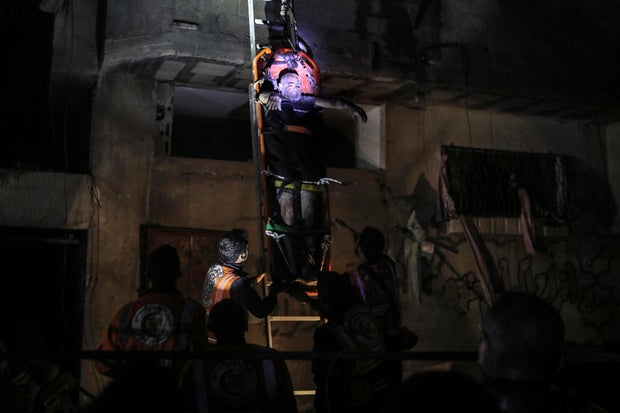A delegation from the militant group Hamas was in Cairo on Saturday as Egyptian state media reported “visible progress” in ongoing ceasefire talks with Israel, while an Israeli official downplayed prospects for a total end to the war.
Pressure has been mounting to reach an agreement – Gaza’s humanitarian crisis is increasing dramatically as Israel insists it will launch an offensive against Rafah, the territory’s southernmost city.
The stakes are high to be able to stop almost seven month war. More than a million Palestinians are sheltering in the city of Rafah along the border with Egypt, many of them having fled northern Gaza, where a senior UN official says there is now total famine.
Egyptian and American mediators have reported signs of compromise in recent days, but the prospects for a ceasefire agreement remain entangled with the fundamental question of whether Israel will accept an end to the war without achieving its stated aim of destroying Hamas.
On Friday, CIA director William Burns arrived in Cairo, Egypt, for latest round of high-stakes talks about a hostage agreement and ceasefire between Hamas and Israel, two U.S. officials and a source familiar with the matter told CBS News.
The visit follows a series of technical talks and a new proposal from Israel that US officials described as “generous”.
Egyptian state news outlet Al-Qahera said on Saturday that a consensus had been reached on many of the controversial points, but did not give further details. Hamas called for a complete end to the war and the withdrawal of all Israeli forces from Gaza.
Ismael Abu Dayyah/AP
Earlier this week, Secretary of State Antony Blinken was back in Israel on his seventh visit to the country since Hamas militants organized their bloody October 7 terrorist attack against the Jewish state, instantly provoking the war in the group’s stronghold in the Gaza Strip.
When he arrived, Blinken said the Biden administration was “determined” to see Hamas and Israel agree to a ceasefire in the conflict, which health officials in the Hamas-controlled Palestinian territory say has killed more than 34,000 people, most of them women. and children. Desperate for more American support, Israelis gathered outside the Blinken hotel in Tel Aviv, some of them holding signs expressing hope that US pressure will help bring home the remaining 133 hostages still believed to be held in Gaza, including five US citizens still believed to be alive.
Meanwhile, the White House urged Prime Minister Benjamin Netanyahu’s government to limit the scale of its operation in Rafah, and the United Nations chief renewed your warning that a military offensive on the city would be “an unbearable escalation, killing thousands of civilians and forcing hundreds of thousands to flee.”
The conflict erupted on October 7, when Hamas attacked southern Israel, kidnapping around 250 people and killing around 1,200, most of them civilians.
A senior Israeli official, speaking on condition of anonymity to discuss ongoing negotiations, played down prospects for a total end to the war. The official said Israel was committed to the Rafah invasion and told the Associated Press that it would not agree under any circumstances to end the war as part of a deal to release hostages.
An attack on the Nuseirat refugee camp in central Gaza killed three people, according to hospital officials.
In the last 24 hours, the bodies of 32 people killed in Israeli strikes were taken to local hospitals, the Gaza Health Ministry said on Saturday. The ministry does not distinguish between combatants and civilians in its calculations, but says women and children account for around two-thirds of those killed.
The Israeli military claims to have killed 13,000 militants, without providing evidence to support the claim. It also carried out mass arrests during its attacks inside Gaza.
Gaza’s Health Ministry also on Saturday urged the International Criminal Court to investigate the death in Israeli custody of a Gaza surgeon. Adnan al-Borsh, 50, was working at al-Awda Hospital when Israeli troops raided it, detaining him and others inside in December, according to the Palestinian Prisoners’ Club.
In related developments this week, Israel briefed Biden administration officials on plans to evacuate civilians ahead of Operation Rafah, according to U.S. officials familiar with the negotiations.
The United Nations has warned that hundreds of thousands of people would be “at imminent risk of death” if Israel advances into the densely populated city, which is also a critical entry point for humanitarian aid.
The US director of the UN World Food Programme, Cindy McCain, said on Friday that civilians trapped in the north, the most isolated part of Gaza, had been plunged into starvation. McCain said a ceasefire and a much greater flow of aid through land and sea routes were essential.
Israel recently opened new aid crossings into northern Gaza, but on Wednesday, Israeli settlers blocked the first convoy before it crossed into the besieged enclave. Once inside Gaza, the convoy was commandeered by Hamas militants, before UN officials claimed it.
The proposal that Egyptian mediators presented to Hamas sets out a three-phase process that would bring an immediate six-week ceasefire and partial release of Israeli hostages, and would include some type of Israeli withdrawal. The initial phase would last 40 days.
Hamas would begin by releasing female civilian hostages in exchange for Palestinian prisoners held by Israel.
Gershon Baskin, Middle East director for the Organization of International Communities, said it appears that Hamas has agreed to the structure proposed by Egypt and that Israel has already accepted it.
He said negotiators are now working out the details – and if Israel sends its top negotiators to Cairo after the end of Saturday night, it would mean the situation is very serious.
___
Jeffery reported from Jerusalem. Associated Press writers Josef Federman in Jerusalem and Bassem Mroue in Beirut contributed to this report.
























